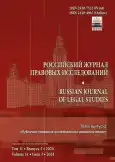Federal Territory: Constitutional and Legal Regulation Development
- Authors: Semenov I.A.1
-
Affiliations:
- Institute of Legislation and Comparative Law under the Government of the Russian Federation
- Issue: Vol 11, No 3 (2024)
- Pages: 25-32
- Section: Trending topic
- URL: https://journal-vniispk.ru/2410-7522/article/view/284798
- DOI: https://doi.org/10.17816/RJLS611108
- ID: 284798
Cite item
Abstract
This article examines the legal status of federal territories as public law entities in the Russian Federation, which emerged as a result of the 2020 constitutional reform. This article discusses issues related to constitutional terminology, the constitutional-legal status, and legal regulation of federal territories, along with an analysis of the practice implementation of the constitutional provisions governing these territories. The specific features of existing federal territories in the Russian Federation and in foreign countries are also reviewed. The necessity for further development of the novelty introduced by the Constitution of the Russian Federation regarding federal territories is underscored, including a discussion on the unique tax regime applicable to these territories.
The article employs several scientific methods, including the comparative-legal method and the formal legal method, with additional methods such as analysis and synthesis also utilized.
Conclusion: Despite the short period between the establishment of the first federal territory and the development of its legal framework, several distinctive characteristics have also emerged in Russian legislation. An analysis of Russian constitutional law reveals key features in the exercise of public authority in this new public law entity. When comparing approaches to public authority in other countries, the models of India, Brazil, and Canada were chosen for comparison. It was found that Russia’s form of public authority within federal territories is unique and does not fully align with any of the models seen in these foreign states.
However, Russian legislation currently lacks a comprehensive law that regulates federal territories as a whole. At present, the only federal territory established in the Russian Federation is the Sirius federal territory, and its legal status is governed by the federal law “On the Federal Territory ‘Sirius’”. This highlights the need for further development of a broader normative framework that regulates the status of the federal territory. Such a framework would not only solidify the legal status of the Sirius federal territory but also provide for future federal territories yet to be formed
Full Text
##article.viewOnOriginalSite##About the authors
Ilya A. Semenov
Institute of Legislation and Comparative Law under the Government of the Russian Federation
Author for correspondence.
Email: ilysem@yandex.ru
ORCID iD: 0009-0004-6991-5425
post-degree student
Russian Federation, MoscowReferences
- Peshin IL. Territorial organization of public government within the borders of federal territories. Constitutional and Municipal Law. 2021;(7):35–40. EDN: PSRGBY doi: 10.18572/1812-3767-2021-7-35-40
- Karimov BR. Federal Territory in the Russian Federation: the first experience of establishment and problems of constitutional law regulation. Constitutional and Municipal Law. 2022;(3):51–58. EDN: HBMMPJ doi: 10.18572/1812-3767-2022-3-51-58
- Lexin IV. Federal territories in Russia: prospects and problems of the implementation of constitutional novelties. Constitutional and Municipal Law. 2021;(8):28–33. EDN: RJXOSQ doi: 10.18572/1812-3767-2021-8-28-33.
- Fokina DV. Changes in Articles 217 and 372.1 of the Tax Code of the Russian Federation: tax exemption. Educational Advisor. 2023;(6):3 (In Russ.)
- Dolinger J, Barroso LR. Federalism and Legal Unification in Brazil In: Halberstam D., Reinmann M., editors. Federalism and legal unification: a comparative empirical investigation of twenty systems. Springer Dordrecht; 2014. P. 153–167.
- Leng Ang H, Whiting A. Federalism and Legal Unification in Malaysia In: Halberstam D., Reinmann M., editors. Federalism and legal unification: a comparative empirical investigation of twenty systems. Springer Dordrecht, 2014. P. 295–337.
- Ostwald K. Federalism without decentralization in Malaysia. Journal of Southwest Asian Economies. 2017;34(3):488–506.
Supplementary files







